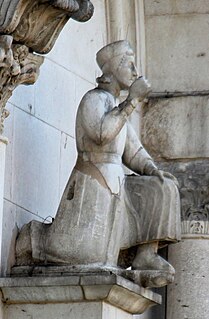AD 16 (XVI) was a leap year starting on Wednesday of the Julian calendar. At the time, it was known as the Year of the Consulship of Taurus and Libo. The denomination AD 16 for this year has been used since the early medieval period, when the Anno Domini calendar era became the prevalent method in Europe for naming years.
Year 80 BC was a year of the pre-Julian Roman calendar. At the time it was known as the Year of the Consulship of Sulla and Metellus. The denomination 80 BC for this year has been used since the early medieval period, when the Anno Domini calendar era became the prevalent method in Europe for naming years.
Year 18 BC was either a common year starting on Friday, Saturday or Sunday or a leap year starting on Saturday of the Julian calendar and a common year starting on Thursday of the Proleptic Julian calendar. At the time, it was known as the Year of the Consulship of Lentulus and Lentulus. The denomination 18 BC for this year has been used since the early medieval period, when the Anno Domini calendar era became the prevalent method in Europe for naming years.

Sextus Pompeius Magnus Pius, also known in English as Sextus Pompey, was a Roman military leader and politician who throughout his life upheld the cause of his father, Pompey the Great, against the dictator Julius Caesar and his supporters, during the last civil wars of the Roman Republic. He formed the last organized opposition to the Second Triumvirate, in defiance of which he succeeded in establishing an independent state in Sicily for several years.
Decimus Junius Silanus Torquatus was a Roman senator who lived during the 1st century. He served as an ordinary consul in 53 with Quintus Haterius Antoninus as his colleague. Decimus was the second son born to Aemilia Lepida and Marcus Junius Silanus Torquatus, a member of the Junii Silani, a family of Ancient Rome.

Scribonia was the second wife of Octavian, later the Roman Emperor Augustus, and the mother of his only natural child, Julia the Elder. Through her youngest daughter she was the mother-in-law of the Emperor Tiberius, great-grandmother of the Emperor Caligula and Empress Agrippina the Younger, and great-great grandmother of the Emperor Nero.
The gens Scribonia was a plebeian family at ancient Rome. Members of this gens first appear in history at the time of the Second Punic War, but the first of the Scribonii to obtain the consulship was Gaius Scribonius Curio in 76 BC.
Cornelia was the daughter of Scribonia and her second husband. She was stepdaughter to Octavian through her mother's third marriage and half-sister to Julia the Elder, Augustus' only biological child.

Lucius Orbilius Pupillus was a Latin grammarian of the 1st century BC, who taught at school, first at Benevento and then at Rome, where the poet Horace was one of his pupils. Horace criticizes his old schoolmaster and describes him as plagosus, and Orbilius has become proverbial as a disciplinarian pedagogue.
Several men of plebeian status were named Lucius Scribonius Libo during the Roman Republic and Roman Empire; they were members of the gens Scribonia.

The giant leopard moth is a moth of the family Erebidae. They are distributed through North America from southern Ontario, and southern and eastern United States through New England, Mexico and down to Panama. The obsolete name Ecpantheria scribonia is still occasionally encountered.
Lucius Aemilius Paullus was the son of Lucius Aemilius Lepidus Paullus and Cornelia, the elder daughter of Scribonia. He was married to Julia the Younger, the eldest granddaughter of the Emperor Augustus.
Pompeia was the name of several ancient Roman women of the gens Pompeia:

Claudia was the daughter of Fulvia by her first husband Publius Clodius Pulcher. She was the stepdaughter of Mark Antony and half-sister of his sons Marcus Antonius Antyllus and Iullus Antonius.
Publius Cornelius Scipio was a Roman senator active during the Principate. He was consul in 16 BC as the colleague of Lucius Domitius Ahenobarbus. He was also proconsular governor of Asia, probably around the years 8/7 BC.
Gnaeus Cornelius Lentulus Marcellinus was a Roman statesman and consul of 56 BC. He was married at least twice. His first wife is unknown but his second wife was probably Scribonia, at least twenty years his junior, who later became the second wife of Augustus.
Marcus Licinius Crassus Frugi, also known as Marcus Licinius Crassus Dives, was the adoptive son of consul Marcus Licinius Crassus, the grandson of triumvir Marcus Licinius Crassus. Frugi’s adoptive father was the last known direct descendant of the triumvir who bore his name.
Scribonia Magna, known in modern historical sources as Scribonia Crassi, was a Roman noblewoman. Scribonia was the daughter and only child of Lucius Scribonius Libo, and Cornelia Pompeia Magna.
Libo Rupilius Frugi, whose full name was Lucius Scribonius Libo Rupilius Frugi Bonus, was a Roman suffect consul and a possible ancestor of the emperor Marcus Aurelius.

Lucius Scribonius Libo was a Roman politician and military commander who was consul in 34 BC and brother-in-law to both Pompey the Great and Augustus. Libo rose to prominence through his connections with Pompey. When Julius Caesar rebelled against the Roman Senate in 49 BC, Libo sided with Pompey. He carried out a variety of military, diplomatic and naval roles, with mixed success.





